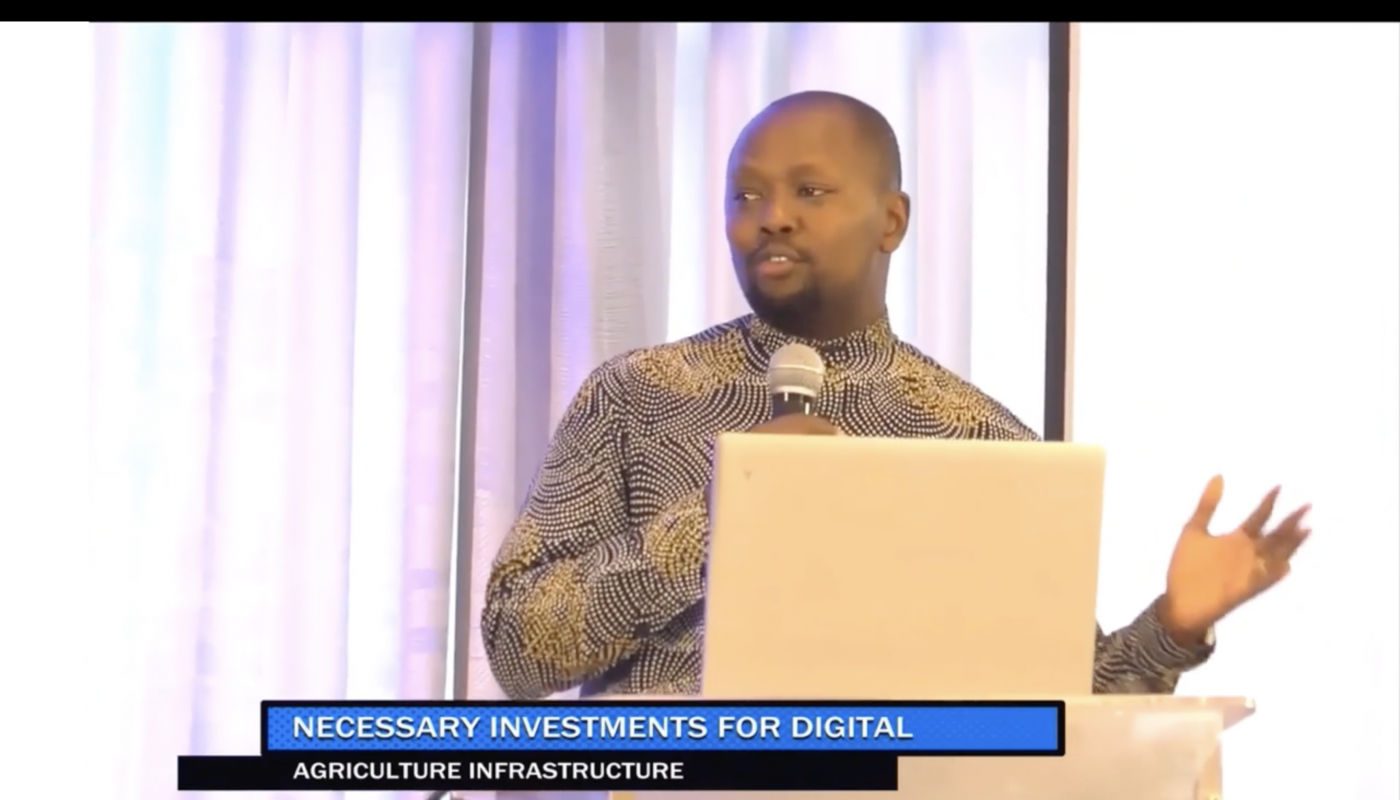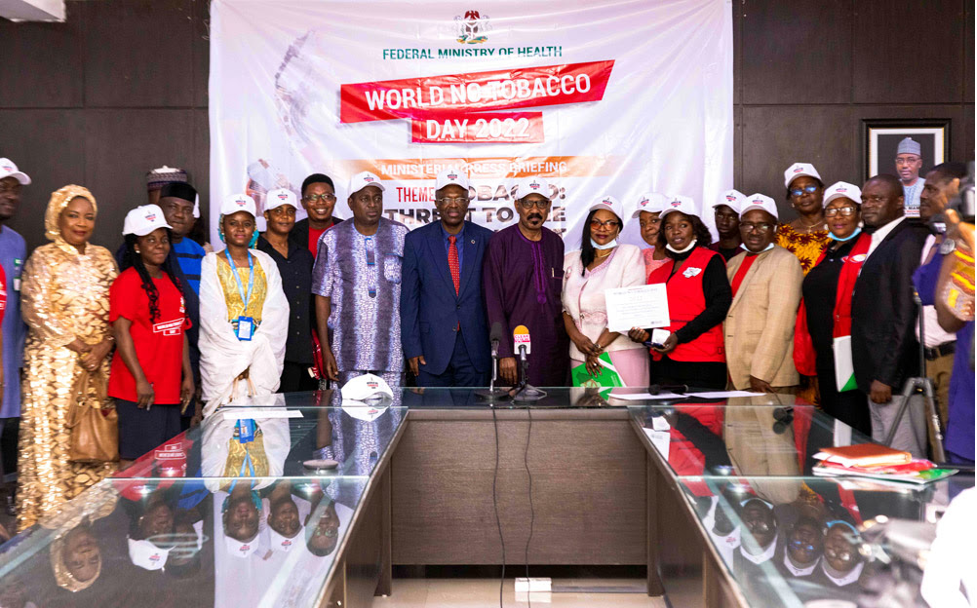
DG’s Tobacco Control Data Initiative: Reflecting on the First Four Years (Part 1)
In 2019, Development Gateway: An IREX Venture (DG) began the Tobacco Control Data Initiative (TCDI). This four-year program—our first in the tobacco control sector—was funded by The Bill & Melinda Gates Foundation and implemented by DG in partnership with the University of Cape Town’s Research Unit on the Economics of Excisable Products.
The aim of this first phase of TCDI was to supply governments, civil society, and academia with improved access to country-specific tobacco control data in order to support better tobacco control policy design and implementation. As we reach the end of the first four years of TCDI, we reflect not only on what we accomplished throughout the first phase of the program but the lessons we learned along the way. We share five key lessons below on how to organize and deliver work as effectively as possible.
Expanding into Tobacco Control: What We Did in TCDI 1.0
Throughout the past four years, some of our key accomplishments in TCDI have included:
- Interviewing more than 120 individuals in order to assess the factors incentivizing data use, identify trustworthy data sources, and discover the biggest data gaps in the tobacco control data landscape;
- Holding eight validation workshops through which we confirmed the stakeholders’ priorities on tobacco control data and confirmed which data gap(s) we would address through primary data collection; and
- Hosting 18 co-design sessions in which we’ve worked with partners to integrate their suggestions into our data visualizations and content.
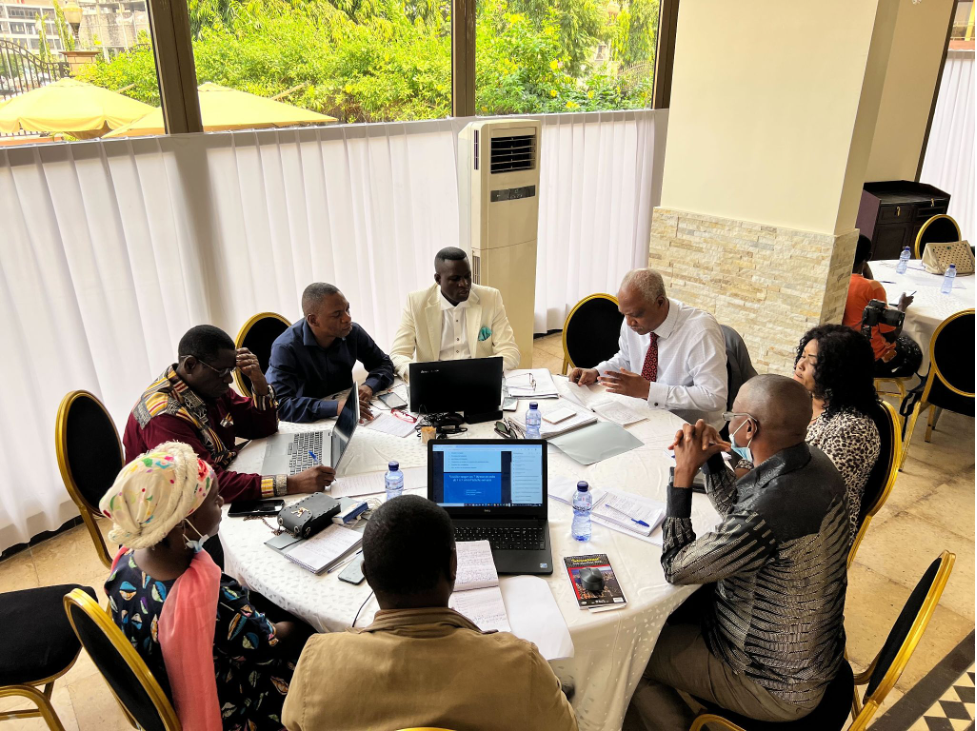
DRC Co-Design Workshop in July 2022.
All of this work culminated in DG creating and launching six country-specific TCDI websites between June 2020 and November 2023. Each website provides information specific to one of the six TCDI countries: the Democratic Republic of the Congo, Ethiopia, Kenya, Nigeria, South Africa, and Zambia.
The information on the websites—which includes data on tobacco use, tobacco control legislation, tobacco trade, etc.—was tailored to meet the specific country’s needs. By providing context-specific data, each website allows those working in the tobacco control sector to make data-driven decisions which, in turn, will allow for more effective tobacco control policies and actions.
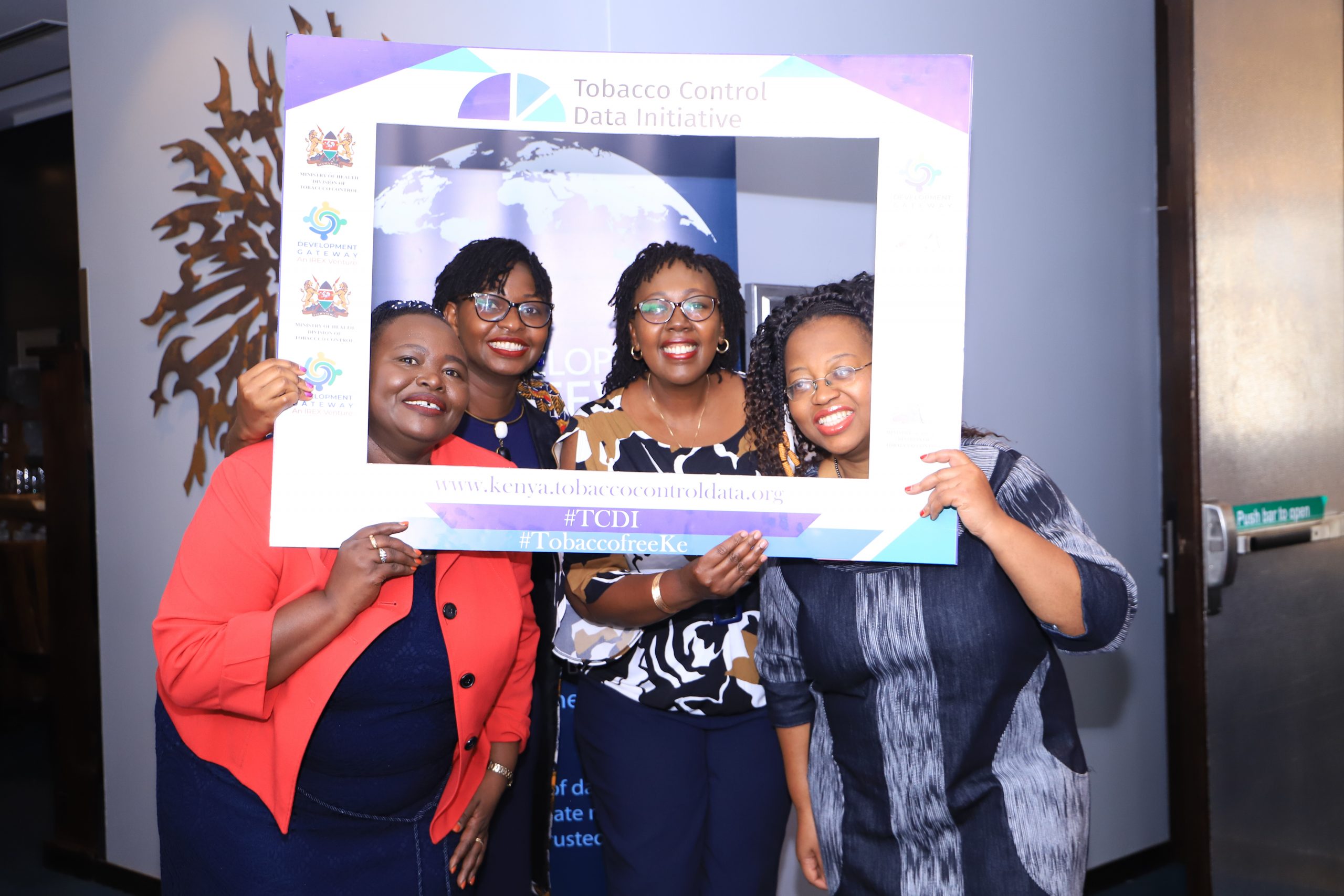
From left to right: Dorcas Kiptui (Kenya – Ministry of Health), Winnie Awuor (DG), Anne Kendagor (Kenya – Ministry of Health) and Rachel Kitonyo-Devotsu (DG) at the Kenya TCDI website launch in April 2023.
In creating and gathering data for these websites, we were able to identify several gaps in tobacco control data. This revelation led us to conduct primary research in multiple countries simultaneously—a first for DG—which is being integrated into the TCDI websites.
Reflecting on TCDI 1.0: Lessons Learned
Throughout our implementation of TCDI, we relied on several of the co-design approaches that DG has implemented throughout our history, including frequent interviews with stakeholders, co-design workshops, and understanding stakeholder insights in order to more effectively use data to inform policy and advocacy. By employing these strengths in the tobacco control sector, we learned five lessons that can be applied across sectors.
-
- Challenge your assumptions: When we began working in tobacco control, our first assumption was that most data we collect or that would be needed by our stakeholders would relate to passing new tobacco control legislation. However, what we found—particularly in the case of Ethiopia—was that data on enforcement of existing laws was much more valuable than passing new legislation, since the most significant gains can be achieved through strengthened policy implementation.
- Put as much thought into governance structures as you do into technical design – Through TCDI we also learned the importance of building clear governance structures alongside technical activities like data collection. For example, in Zambia, we created a steering committee so that key government stakeholders would be kept informed on primary research activities and could approve the research protocol at key stages. However, we did not apply that strategy across all TCDI focus countries, and instead updated our government counterparts on an ad hoc basis. In certain cases, we received feedback that our focal points in the Ministry of Health felt that they weren’t involved enough in the process—which required our team to reach out to them and restructure our communications. In the future, such challenges can be avoided through a clear governing structure such as a steering committee in each country.
- Building trust in data is critical: In creating trusted websites with key data, we found we couldn’t just focus on the data: we also had to focus on building relationships. As we discussed in this blog, when we started TCDI, DG was unknown in the tobacco control sector. By having partners, like Campaign for Tobacco-Free Kids and others in the tobacco control community, introduce us to Ministry of Health counterparts and longstanding tobacco control advocates, we became known and trusted. Through these efforts and with strong official support from the Ministries of Health in each TCDI country, we’ve released each TCDI country website with strong public and official support.
- Federation leads to efficiency and stakeholder responsiveness—as long as you’re communicating with each other: The overall strength of the TCDI program largely came from the strength of each individual “sub” team. The TCDI team includes six country teams (one for each TCDI country), a tech team, and a research team. Through this “federation,” teams were able to independently manage everything from website development to research collection. To facilitate easy handoffs between “sub” teams, we relied on tried and true practices in agile project management, including thrice-weekly scrums, weekly sub-team meetings, and virtual coworking sessions. Through these formats, the teams communicated frequently and shared lessons learned between parallel team members.
- Sustainability isn’t built in a day: When we initially created our sustainability approach, we anticipated a number of challenges inherent in finding long-term success. Finding an organization that had a presence in the key TCDI countries, operated well remotely, boasted a strong research portfolio in tobacco control, and had a strong software development team was like finding a needle in the haystack. After difficulty in finding an organization with a similar profile to DG, we changed our approach to sustainability. We redefined roles and responsibilities and asked for advice from other organizations that had successfully transferred long-term ownership of programs to other organizations. As a result of this effort, we’re pleased to announce that DG will be working with The Centre for the Study of the Economies of Africa during the second phase of the program: TCDI 2.0, which is being funded by an additional four-year grant from The Bill and Melinda Gates Foundation. We explore what this phase of the program will look like in the second part of this blog.
Share
Recent Posts
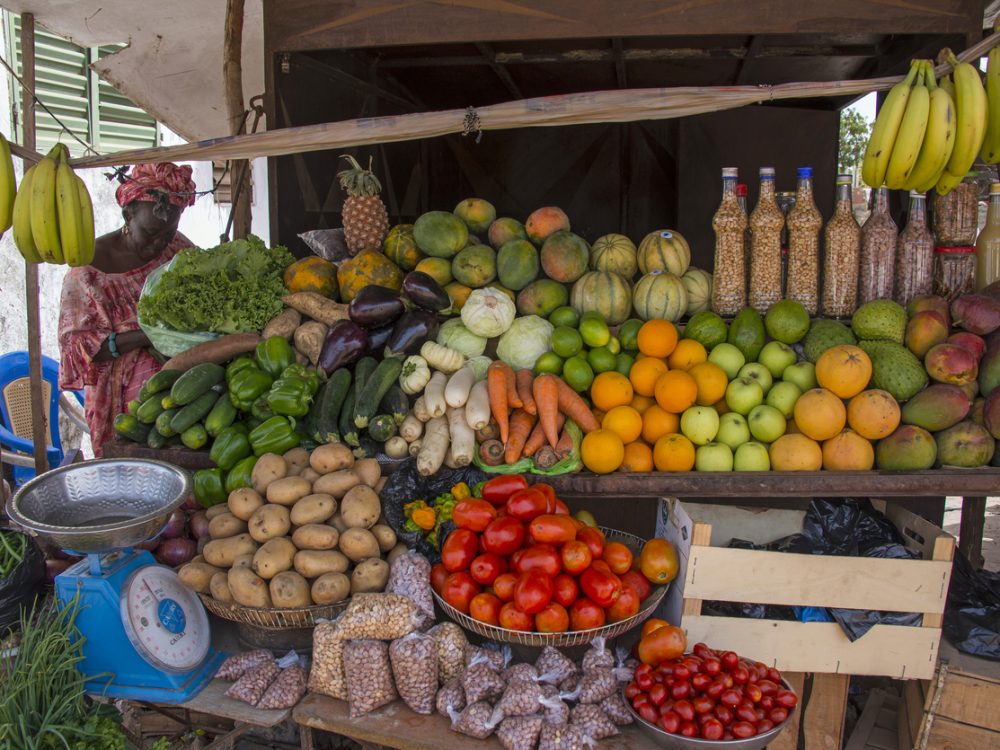
Development Gateway Collaborates with 50×2030 Initiative on Data Use in Agriculture
Development Gateway announces the launch of the Data Interoperability and Governance program to collaborate with the 50x2030 initiative on data use in agriculture in Senegal for evidence-based policymaking.

Strengthening Online Safety Through Prevention in the Philippines
Tech-Facilitated Gender-Based Violence continues to evolve alongside emerging technologies. This blog explores how preventative measures, such as the Safety By Design approach, can be used to create a safer internet.
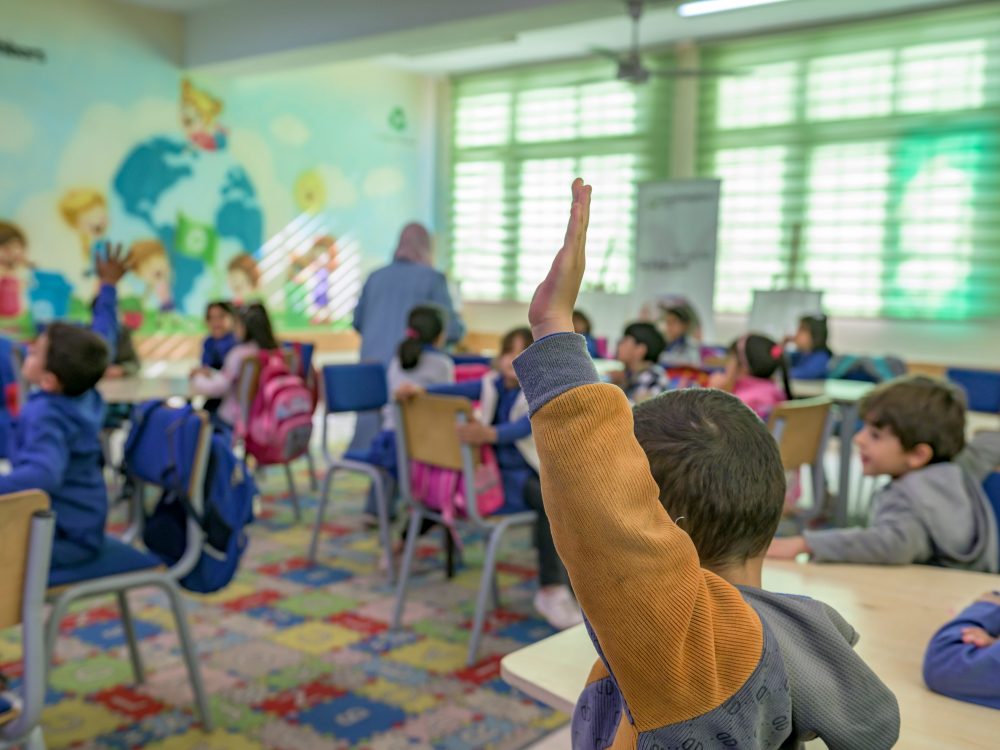
Preparing Jordan’s Education System for the AI Age
This blog introduces Asas, an early grade education program led by IREX and DG in partnership with Jordan’s Ministry of Education, and explores what AI readiness looks like in early grades and how AI can be integrated safely and sustainably into education systems.
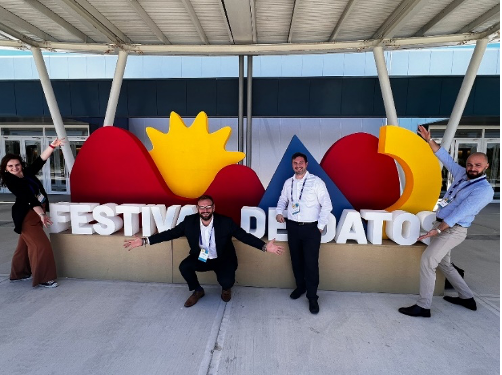
Developing Data Systems: Five Issues IREX and DG Explored at Festival de Datos
Both IREX and Development Gateway: An IREX Venture (DG) participated in Festival de Datos. This conference, held in Uruguay from November 7-9, 2023, is the flagship event of the Global Partnership for Sustainable Development Data and convenes the data for development community to explore how to use data to tackle pressing global issues, including democracy, human rights, climate change, and agricultural economies. At Festival de Datos 2023, IREX and DG participated in nine sessions in which we shared our work to develop effective and inclusive data systems.
What are data systems and why are they important?
Data systems are comprised of various data-related elements within or across institutions that can support decisions and potential solutions for a specific issue. These elements include datasets, digital tools, user communities, protocols, and partnerships.
Improving how these elements engage with each other is important in making data actionable, especially to solve problems; however, making these improvements requires thoughtful consideration to mitigate potential harms to people and communities. At Festival de Datos, IREX and DG explored the five issues below to support mitigating potential harms and furthering possible benefits of data systems.
1. Sub-national and local data systems rely on community engagement and ownership.
An increasing priority among the data for development community is investing in data systems at the sub-national and local levels. Despite this priority, activities and resources developed to improve data systems often do not incorporate community engagement as a key part of the process. This limitation was highlighted in a session on agricultural data facilitated by Annie Kilroy, DG’s Technical Advisor for Data and Analytics.
During this session, Kilroy and others noted that there is significant demand among local partners to invest in farm-level data; however, farmers’ willingness to contribute to data collection is sometimes limited because of insufficient protection, transparency, and ownership in the data collection and use.
To address concerns about data ownership, both IREX and DG have systems that give citizens control over how data collected from them and their community is collected and used. For example, IREX’s Data Zetu program is a citizen engagement program to improve access to public health resources, and DG’s Open Contracting Portal is a digital tool increasing transparency in government contracts and supporting local businesses looking to fill them. While each of these examples are unique, both programs work with community members to understand local perspectives around specific challenges and create ownership in those solutions after the programs have ended.
2. Effective data partnerships require the ability to access and process data along with trust, transparency, ownership, and feedback.
During a plenary session at Festival de Datos, DG CEO Josh Powell and others highlighted four steps to building effective data interoperability practices to support data partnerships. Advancing data partnerships, in which actors share data to create solutions to specific challenges, is important because they help address challenges across data systems and sectors. However, these partnerships are often limited by the insufficient ability to access and process data from multiple sources; therefore, improving the ability to access and process data through the following four steps is vital:
- Improve trust between institutions by facilitating transparent data-sharing on common problems;
- Be transparent with how data is being used and securely stored and accessed;
- Establish a clear ownership of datasets with the institutions and communities they reflect, avoiding an extractive power-dynamic; and
- Develop accessible feedback loops that communities and stakeholders can continuously learn from and validate elements of their datasets.
DG has also helped develop tools, such as the data maturity assessment, to support data administrators in accomplishing these steps by acknowledging the functions and considerations at the organizational, human, data, and technological levels.
3. Advancing inclusion in a data system requires an understanding of the local context.
In a joint session facilitated by IREX and DG, Annie Kilroy and Philip Davidovich, IREX Technical Advisor for Data and Digital Literacy, explored what makes a data system inclusive and how inclusion can be assessed and improved. Improving inclusion in data systems is essential because it allows for higher quality datasets that more accurately reflect the perspectives and issues existing in the communities connected to the data. Inclusive data practices also ensure that data is collected and used for all people, regardless of location, ethnicity, gender, or age.
Using IREX’s Data Compass methodology that customizes the development of indicators to reflect local considerations, Kilroy and Davidovich highlighted the formal and informal elements associated with assessing inclusion in different environments. Overall, this session highlighted that the ability to meaningfully improve inclusion requires a refined assessment framework that’s responsive to local contexts and problems. Resources such as IREX’s Data Compass and DG’s CALM methodology apply that level of customization to create inclusive data systems that are holistic and reflect local conditions.
4. Data governance, which is evolving, is a key enabler in developing a responsible and ethical data system.
Tom Orrell, a senior advisor at DG, facilitated a peer learning discussion around two emerging issues in the data governance space. Data governance practices—the policies, actions, decisions, and technologies that guide institutions and communities on data use—are rapidly evolving to keep up with new technologies and emerging issues. Because data governance is a key enabler in how data systems function, incorporating responsible and ethical considerations into data governance frameworks was a major topic of discussion throughout the festival. Emerging issues that surfaced in Orrell’s session were:
- Africa’s emerging data governance frameworks should balance Africans’ own interests with those of other geopolitical blocs, including the United States, the European Union, and China; and
- The many conversations on using artificial intelligence and machine learning tools indicate that the field of data governance itself is rapidly evolving.
In response to the rapidly changing data governance space, DG is considering how to incorporate innovative approaches in their work, especially as their long-standing digital tools that impact users’ data governance approaches are repurposed to address emerging global issues.
5. Building a data culture helps sustain effective data systems, and it starts by investing in people.
Finally, building an inclusive data culture was the focus of a lightning talk and Q&A discussion facilitated by Davidovich. Building a sustainable and impactful data system requires investing in individual users’ data skills, such as literacy, analysis, and decision-making. After all, every actor that engages in a data system contributes to the culture in how that data is collected, managed, and used, which impacts the effectiveness of the data system. Therefore, the culture of a data system needs to be inclusive of everyone within that system.
To support this inclusivity, IREX recently created the Data Learning Journey Playbook, a field-tested resource with independent and team activities on building and sustaining data culture and skills in global development. In the session, Davidovich highlighted the five skills the Playbook offers support in building:
- Identifying an opportunity to use data;
- Achieving your data literacy needs;
- Working with data responsibly;
- Fostering effective discussions around data; and
- Building collaborative data practices.
By participating at Festival de Datos and highlighting these five key issues related to data systems, both IREX and DG hope to engage the development data community in finding innovative solutions that ensure data and technology support local leaders and global communities to create more just, prosperous, and inclusive societies.
Share
Recent Posts

Development Gateway Collaborates with 50×2030 Initiative on Data Use in Agriculture
Development Gateway announces the launch of the Data Interoperability and Governance program to collaborate with the 50x2030 initiative on data use in agriculture in Senegal for evidence-based policymaking.

Strengthening Online Safety Through Prevention in the Philippines
Tech-Facilitated Gender-Based Violence continues to evolve alongside emerging technologies. This blog explores how preventative measures, such as the Safety By Design approach, can be used to create a safer internet.

Preparing Jordan’s Education System for the AI Age
This blog introduces Asas, an early grade education program led by IREX and DG in partnership with Jordan’s Ministry of Education, and explores what AI readiness looks like in early grades and how AI can be integrated safely and sustainably into education systems.
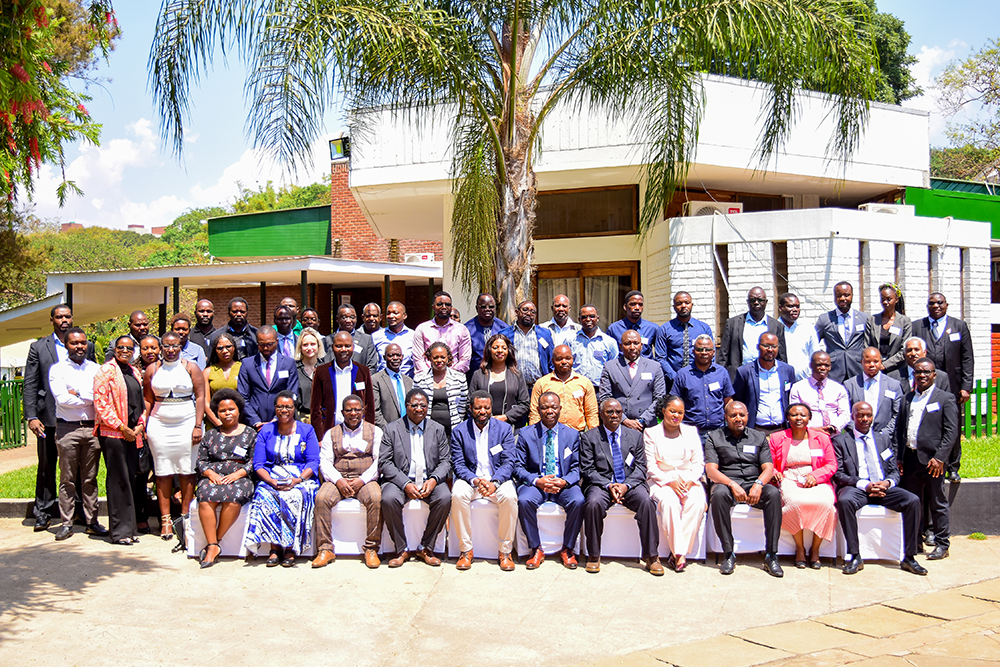
Unlocking the potential of digital public infrastructure for climate data and agriculture: Malawi
In September 2023, Development Gateway: An IREX Venture’s (DG’s) DAS program participated in “Multi Stakeholder Dialogue in Malawi on National Data Infrastructure for Climate Decision Making,” an event convened by the Commonwealth Secretariat and hosted by the Government of Malawi in collaboration with AGRA and the financial support of Open Societies Foundation and GIZ. The event brought together stakeholders in the public and private sector to explore creating a national digital public infrastructure (DPI) in Malawi, with the ultimate aim of increasing the impact of climate data to combat current and future agricultural issues caused by climate change.
This event was one in a series of national dialogues that the Commonwealth Secretariat will host. Subsequent events will be held in Ghana, Barbados, and Bangladesh; each dialogue will be customized to address country specifics while being centered around building national DPIs to better utilize climate data and, in turn, create more resilient food systems in each country.
From the dialogue during this event, participants discovered three key insights (below) to support Malawi in developing its DPI.
What is Digital Public Infrastructure?
According to the United Nations Development Programme, DPI is the technological infrastructure supporting easily accessible, digitized, and connected services that allow individuals and groups to access a given type(s) of data. An individual might interact with DPI when they use their smartphone to access government and other services through an interoperable authentication and payment system. Another example of an interaction with DPI is when an individual accesses the latest weather data using open climate platforms to make informed decisions regarding their agri-business.
In order for a DPI to reach its full potential, certain safeguards should be built in, including such things as ensuring accessibility of public data as appropriate, privacy policies protecting individually identifiable data, appropriate use, etc.
Why Do Nations Need DPIs?
Without a national DPI, unrealized potential and inefficiency prevail, and nations often have multiple, incompatible data systems with data fragmented across them. This dynamic results in operational difficulties, data duplication, and a power imbalance between data owners and holders. Overall, a national DPI benefits everyone from individual citizens to third party organizations.
For citizens, DPIs allow individuals to access streamlined public and private services without compromising their data. For organizations, having a national DPI provides a framework that allows data sharing across different parties, which helps these organizations reduce costs and avoid data duplication. These benefits are achievable because the DPI systems are designed for data sharing.
Additionally, third parties can use data in the DPI to improve outcomes by determining the risks and benefits of doing business with certain individuals or organizations. In the case of agriculture, the DPI data can improve agricultural production by guiding financial institutions on which farmers to finance (including farmers who might otherwise not have access to financing).
Specific to agriculture, a national DPI—in addition to providing the benefits outlined above—would also make disparate climate and agriculture data (e.g., data on soil properties, weather patterns, and land use) accessible and would help farmers identify opportunities, reduce risks, and therefore, boost productivity.
Insights from the Malawi Dialogue
As established above, DPIs are essential to combating climate change and allowing for effective harnessing of data to create more resilient food systems. Therefore, the insights gathered from the discussion can guide Malawi and other actors in developing DPIs and maintaining strong data ecosystems and data use during and after a DPI is established.
- Up-to-date data management practices are vital: During the discussion, participants recognized the importance of moving from paper-based to digitalized database storage. Having up-to-date data management practices allows for the collection of more accurate, timely, and accessible data that can be integrated into a DPI.
- Data collection approaches should be standardized: Discussing the variety of data collection methods—including face-to-face surveys and digital data collection tools, participants came to a consensus that a standardized approach to collecting data should be established. A standardized approach would result in consistency in data collection which expands the possibility of comparing data and identifying actionable next steps.
- Embedding interoperability into the DPI will help ensure sustainability and usability: Many data elements are commonly collected by different institutions. Collaboration and data sharing advances the value of these data elements allowing for improved data-based decision-making. Therefore, different data systems and platforms used in the DPI must be able to work together (be interoperable) in order to allow for this improved accessibility and efficiency.
Looking Ahead: The DAS Program
Going forward, DG’s DAS Program will continue to work with Malawi and other countries to assess opportunities on providing technical assistance and advisory support to inform decisions related to DPIs and other tools and strategies to advance agriculture in Africa.
Learn more about the DAS Program here.
Share
Recent Posts

Development Gateway Collaborates with 50×2030 Initiative on Data Use in Agriculture
Development Gateway announces the launch of the Data Interoperability and Governance program to collaborate with the 50x2030 initiative on data use in agriculture in Senegal for evidence-based policymaking.

Strengthening Online Safety Through Prevention in the Philippines
Tech-Facilitated Gender-Based Violence continues to evolve alongside emerging technologies. This blog explores how preventative measures, such as the Safety By Design approach, can be used to create a safer internet.

Preparing Jordan’s Education System for the AI Age
This blog introduces Asas, an early grade education program led by IREX and DG in partnership with Jordan’s Ministry of Education, and explores what AI readiness looks like in early grades and how AI can be integrated safely and sustainably into education systems.
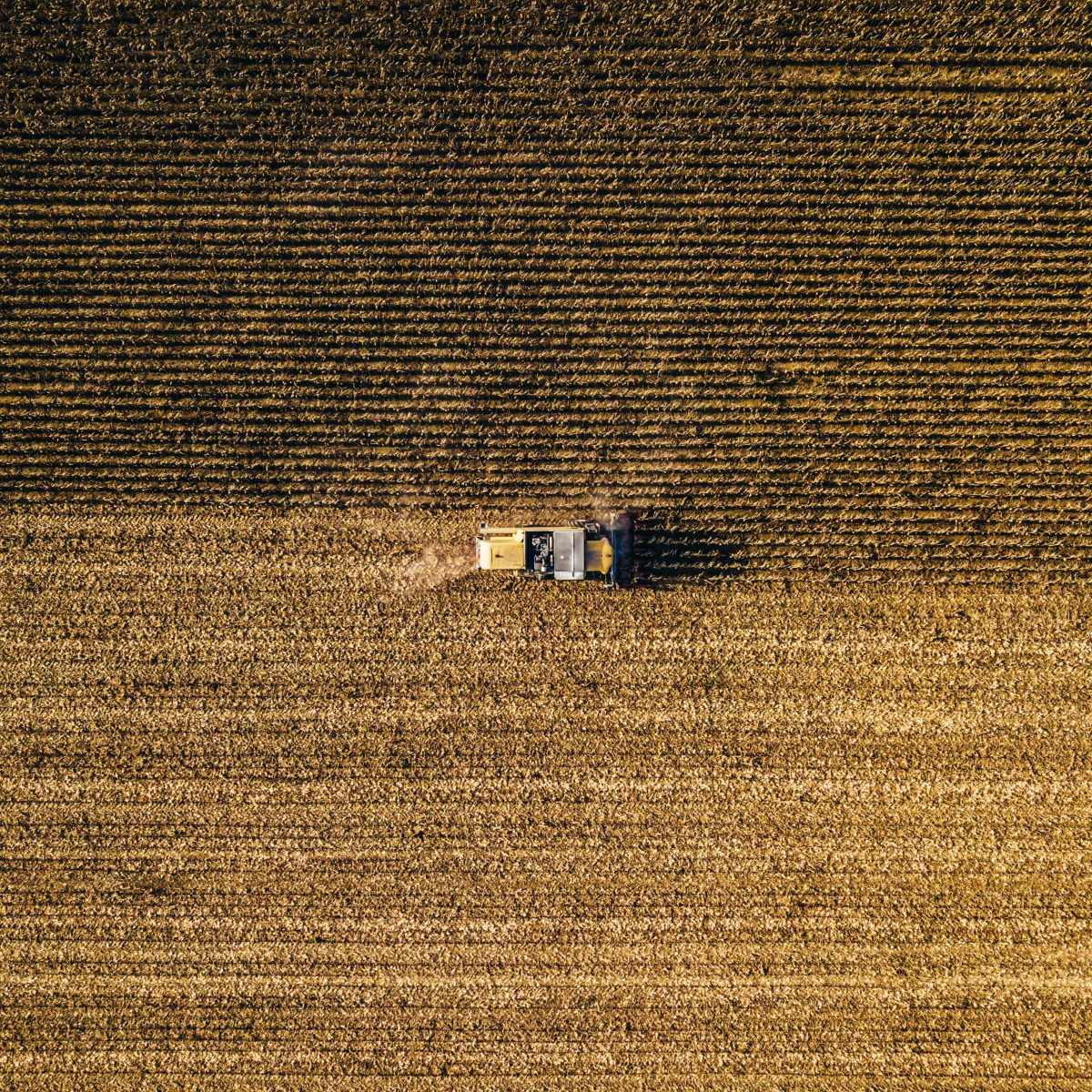
What Does a Good Agriculture Data System Look Like? Reflections from 2023 Festival de Datos
DG collaborates with national and subnational governments, civil society, farmers, private sector, and development partners to improve data systems and processes for data collection, sharing, and use in agriculture. From conducting digital agriculture ecosystem assessments in Ghana to working to build a first-of-its-kind comprehensive data system for livestock in Ethiopia, DG has significant learned experience in developing digital ecosystems that empower farmers and stakeholders across the value chain. While there is no one-size-fits-all approach to building an effective agricultural and food data system, our joint session at 2023 Festival de Datos posed the question: What does a “good” agriculture data system look like? In this blog post, we’ll delve into the key principles that emerged from the discussion.
Key Principles of a Good Agricultural Data System
1. Include as much of the agricultural value chain as possible. This means taking a comprehensive view to data collection and use: from farmers and the inputs they use, to the crops they produce and even their routes to market. If policymakers do not have access to the complete picture of the entire agricultural supply chain, effective agricultural policy interventions become difficult to achieve. Good agricultural data systems look beyond crop yields and include data on such things as access to seeds, fertilizer, and include formal and informal markets.
2. Good systems are built from the ground up. Agricultural data systems implemented from the bottom-up (i.e., at farmer or farm-level) are more sustainable than those that are top-down or seek to extract predefined data from farmers. As one participant from the discussion rightly pointed out: “If you have to require a smallholder farmer to download an entire mobile application just to report on four numbers, you’ve already lost.”
Encouraging bottom-up participation can advance the mutually beneficial aspects of data systems. After all, when it comes to agriculture data, farm-level data is key not only for top-down stakeholders, like policymakers and government officials making decisions on investing in soil-specific seed and fertilizer varieties, but also for farmers and other local communities as they increase their yield by tailoring crops and farming techniques to their land. Therefore, data collectors should tailor their approach to first meet the needs of the farmers and communities providing that data; doing so will incentivize farmers and other data stewards to report timely and useful data, which will ultimately benefit all interested parties and provide a more comprehensive picture of the data landscape.
Additionally, it pays to investigate what data already exists, rather than starting from scratch. An inclusive, effective data system builds on existing multi-stakeholder initiatives, avoiding a top-down imposition of data extraction and instead incentivizing data sharing. DG has taken this approach by assembling stakeholder councils and technical working groups to ensure our data systems were designed with maximum input from target users and stakeholders (e.g., our Cashew-IN and VIFAA programs). Through this approach, our partners were able to inform the development of the data systems they would use and ultimately, contributed to data governance efforts.
3. Good systems include participatory data governance mechanisms. Systems should facilitate data governance—which is a shared approach to managing data, systems, security, and resources—across disparate, often siloed data sources by clearly defining standards for data, interoperability and indicator calculations. Transparent and rigorous data standards that join up all parts of the data value chain can help break down barriers to data sharing in public-private partnerships.
In our VIFAA project, when developing systems for fertilizer data tracking and management, we centered concerns from farmers and policymakers but also recognized concerns from fertilizer corporations about sharing their data, particularly when it came to what they considered to be trade secrets. We acknowledged these needs through the use of nondisclosure and confidentiality agreements, creating trust with the private sector and enabling the development of a data system that could help everyone.
4. Finally, a good system doesn’t let perfect be the enemy of “good enough.” Participants of this session agreed that there are many agricultural data systems that exist—but very few of them can be considered “good,” especially if we stick to the definitions above. For example, many agricultural data systems are project or product-based, meaning that the data they hold are under exclusive rights by the entity (i.e., private company or development partner) carrying out the work. Other statistical data on agricultural systems is unreliable due to capacity and resource constraints that limit many countries’ abilities to conduct thorough agricultural or land use censuses.
But we posit that good agricultural data systems had to start somewhere and likely weren’t built overnight; what would make these systems good enough to start using for some imperfect but slightly-more-informed policy decisions? Can you start with collecting data on just one crop? Or can you start implementing changes in just one district? Maybe you don’t have enough data to say something with statistical certainty, but you can have enough confidence in the data to which you do have access to make informed decisions.
In the ever-evolving landscape of digital agriculture, the pursuit of a “good” agricultural data system requires adaptability, inclusivity, and a constant commitment to improvement. And as we continue to navigate this complex space, DG will continue to prioritize building agricultural data systems that are not just technologically sound but also responsive to the diverse needs of farmers and stakeholders. Stay tuned to learn more about our process and learnings in our digital agriculture portfolio, including the launch of a comprehensive livestock data system in Ethiopia and developing numerous knowledge products for smallholder farms.
Share
Recent Posts

Development Gateway Collaborates with 50×2030 Initiative on Data Use in Agriculture
Development Gateway announces the launch of the Data Interoperability and Governance program to collaborate with the 50x2030 initiative on data use in agriculture in Senegal for evidence-based policymaking.

Strengthening Online Safety Through Prevention in the Philippines
Tech-Facilitated Gender-Based Violence continues to evolve alongside emerging technologies. This blog explores how preventative measures, such as the Safety By Design approach, can be used to create a safer internet.

Preparing Jordan’s Education System for the AI Age
This blog introduces Asas, an early grade education program led by IREX and DG in partnership with Jordan’s Ministry of Education, and explores what AI readiness looks like in early grades and how AI can be integrated safely and sustainably into education systems.
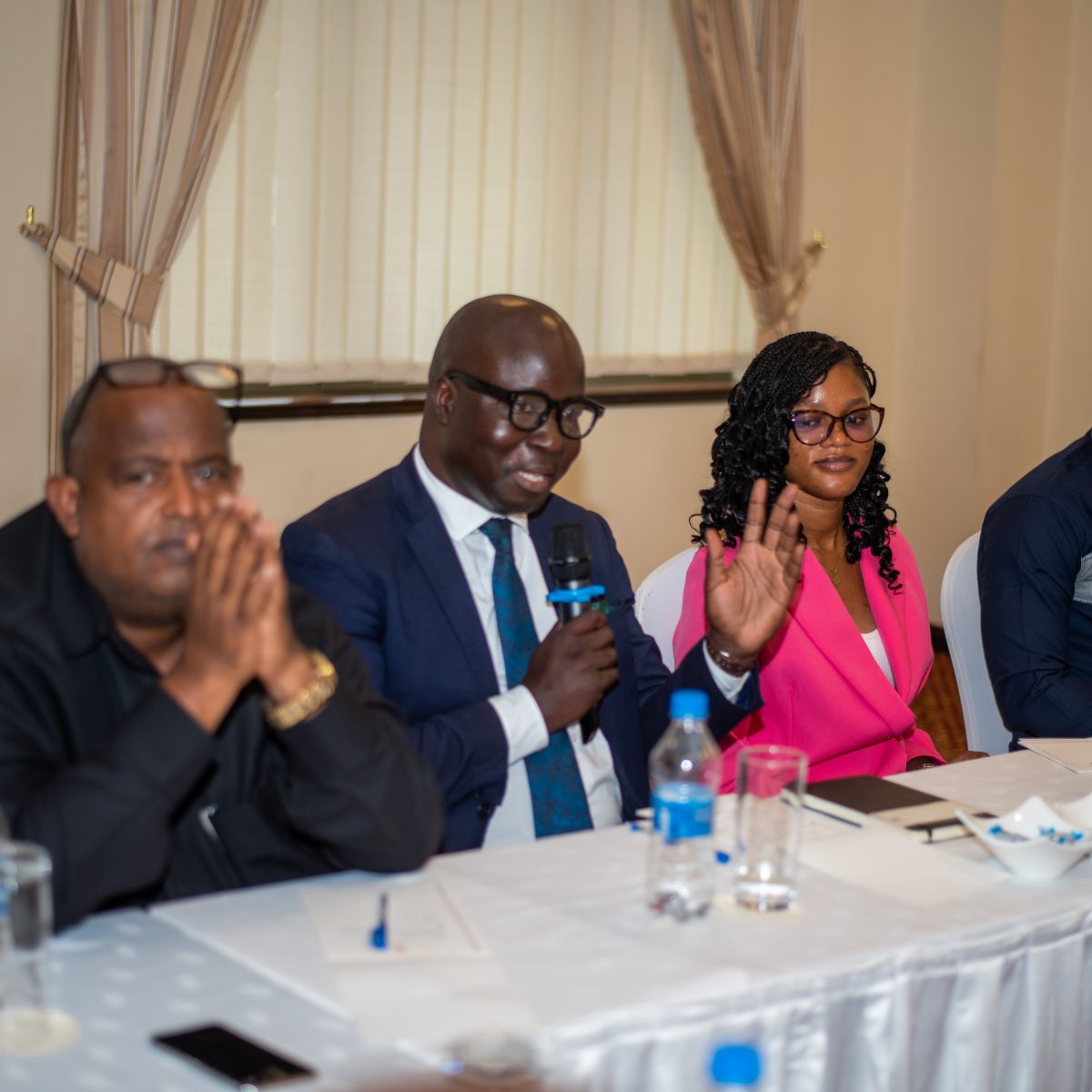
Three Key Takeaways From Discussions on Digital Transformation in Agriculture
Development Gateway: An IREX Venture (DG) hosted a discussion titled “Transforming Food Systems: The Power of Interoperability and Partnerships” at both Africa Food Systems Forum (AGRF) 2023 and the recently concluded ICT4Ag conference. Discussions from these critical events revolved around key themes crucial to DG’s ongoing work, including connecting people, institutions, partners, and systems when we think about technology working at scale to transform agriculture.
Reflecting on our participation in both AGRF and ICT4Ag, three items still stand out in particular as conversations around the digital transformation of agriculture continue into 2024:
A culture of data sharing from the top-down is key
One central point emphasized during the summit was the need for policy-making around data sharing. This illuminates a long-standing issue: decisions around agriculture aren’t just made at the national level but are part of regional value chains for which a lot of data travels from country to country.
Oftentimes, a high-level decision to mandate data sharing from the top-down can be the most effective way to establish a broader culture of data for decision-making. As we’ve observed, working on data-sharing policies or protocols project by project is extremely time- and energy-intensive. As cycles change, staff turnover with the end of projects and the beginning of new ones, and all of the work that goes into data-sharing piece by piece often gets lost or interrupted. One avenue to address this is through the use of international or regional policy treaties and conventions to push for data sharing at a broader, even continental level in Africa. This concept was discussed in several sessions and events throughout AGRF 2023 and is worth broader consideration.
At DG, this is a conversation we’re actively having as part of the aLIVE project in Ethiopia. Recently, we held talks with Ethiopia’s Minister of Agriculture, stressing that data-sharing piece by piece isn’t the most strategic approach; rather, the government could pass a high-level policy establishing a broad, collaborative approach to data sharing, so others can focus on doing the work of bringing the different data together and fixing the issue of data unavailability. Ethiopia’s recently approved data protection law is a great start.
Separately, the elephant in the room continues to be the integration of private sector data. A perception persists, even among the summit attendees, that not all stakeholders want to share their data. A significant realization (one we’ve also had through DG’s VIFAA program in Nigeria) was that the private sector, which is often perceived as reluctant to share data, could be incentivized to do so through assurance that such sharing wouldn’t place them at a strategic disadvantage. This is another important reason that a top-down approach can be pivotal.
Harmonization still needs to drive agriculture systems and effective policy-making
With the rise of generative AI, machine learning, and the data lakes that will power these innovations, interoperability is a fundamental prerequisite for scaling AgTech. True interoperability, in the form of real-time connected systems and datasets, will be difficult to institute and scale without harmonization and standardization of data first, or at least in parallel.
Investment in data harmonization requires work in breaking down existing silos—another reason the top-down approach to data sharing can be critical. Ultimately, this work leads to the development of shared indicators and subsequently, shared high-quality data. When we think about viability and interoperability, it’s on two levels: standardizing systems with data that can be aggregated, but it’s also about making better choices to not endlessly create new systems when existing ones with better resourcing could fill that need.
The Sudan case study, produced through the IFAD-funded Digital Advisory Support Services for Accelerated Rural Transformation (DAS) Program, is a good example. The team advised the Integrated Agricultural and Marketing Development Project (IFAD) to foster partnerships aimed at adopting and adapting existing digital tools (rather than developing new tools) and on the value of choosing to invest their funds to scale instead.
Localization must be built into technology development
Challenges remain in the expansion of digital space and the localization of content. Language barriers, particularly in content localization, were identified as significant hurdles. While localization was unanimously recognized as indispensable, the process was acknowledged to be resource-intensive. Additionally, the nuanced complexities of different dialects and cultural contexts were highlighted, emphasizing the need for meticulous attention to detail in content translation and adaptation.
So far, DG is making progress in localizing content by translating it into French and Arabic as part of the IFAD-funded Digital Agriculture Resources Hub. We’ve found that it takes time to find the right kind of translation to make sure that our content is localized appropriately, especially with concepts and ideas that are complex to explain in any language. For instance, a language such as Arabic is not mutually intelligible. Arabic speakers from North Africa or East Africa aren’t always going to understand Arabic that is spoken and translated by someone who is an Arabic speaker from Saudi Arabia.

A group of panelists and participants at AGRF 2023.
Way Forward
So what’s the way forward? Firstly, there is a need to consider data availability not merely as a technicality but as a powerful tool for decreasing risk around critical decisions for individuals and organizations alike. Access to key data and information can go a long way in helping everyone who works at the intersection of agriculture and technology and can build new, efficient processes for decision-making for governments, farmers, and the private sector.
In addition, we must shift toward a holistic approach to agriculture. This approach would necessitate moving beyond the siloed perspective of individual crop value chains, encouraging stakeholders to envision agriculture as an integrated system where every component plays a vital role.
Finally, we must recognize that localization is not merely a point of interest to a project. Rather, localization must be a core part of the development stage in order to ensure the work is truly designed in accordance with the country or regional context. Adequate resources and strategic planning are essential components of successful content localization initiatives, and organizations should establish these values in their work at the outset.
Share
Recent Posts

Development Gateway Collaborates with 50×2030 Initiative on Data Use in Agriculture
Development Gateway announces the launch of the Data Interoperability and Governance program to collaborate with the 50x2030 initiative on data use in agriculture in Senegal for evidence-based policymaking.

Strengthening Online Safety Through Prevention in the Philippines
Tech-Facilitated Gender-Based Violence continues to evolve alongside emerging technologies. This blog explores how preventative measures, such as the Safety By Design approach, can be used to create a safer internet.

Preparing Jordan’s Education System for the AI Age
This blog introduces Asas, an early grade education program led by IREX and DG in partnership with Jordan’s Ministry of Education, and explores what AI readiness looks like in early grades and how AI can be integrated safely and sustainably into education systems.

How Increasing Trust Can Help to Deliver the 2030 Agenda
As the Festival de Datos gets underway in Uruguay this week, hundreds of government officials, civil society leaders, academics, and policy-makers are gathering to take stock of the data for development agenda. By design, the Sustainable Development Goals (SDGs) have long held close ties to the UN data revolution, a movement aiming to leverage our ever-increasing access to data, and acknowledging the huge potential of that data to act as a source for good, informing and transforming society and protecting the environment.
Yet, since the data revolution was launched in 2015, we have increasingly seen fundamental challenges take the fore around power, privacy, and participation. This year’s explosion in the oft-questionable use of data in fueling innovation in emerging technology, most notably in generative AI, has accelerated the need to confront the potential threats of data misuse, particularly in countries with closed and closing civic spaces. As trust in institutions sags globally, with it, trust in those institutions to use data safely and effectively suffers. This deficit of trust is occurring at a time when there is more data and more technological innovation than ever before, and therefore more opportunity for misuse – intentional or otherwise.
DG has long believed in harnessing the power of data and technology to drive progress toward a more sustainable, equitable, and prosperous world. But in order to live up to these promises, we must work together for a fair data future, one that supports people in how they are represented in data and includes those who have long been left out altogether. Fully distilled, the original promise of the data revolution can only be realized within a culture of trust.
Trust is the foundation for – and can be the result of – good data governance, data sharing, and data use. My colleague Kristin Lord, the CEO of our partner organization IREX, writes that trust is the basis of all effective relationships, and this is no less true when it comes to the use of data and technology. A high-trust ecosystem provides the conditions in which good data governance, efficient data sharing, and responsible and impactful data use can flourish.
When it comes to data governance systems, trust serves as the foundation and the mortar, underpinning the successful implementation and broad acceptance of these systems, and bridging the needs and interests of different constituencies. People need assurance that their data will be handled responsibly, ethically, and securely, and this is especially important in our broader culture of data misuse and faulty protections by private entities and governments alike. A robust data governance framework that prioritizes transparency, enforceable accountability, and explicit data protection fosters this trust. Public trust in data governance not only ensures compliance with regulations but also encourages participation in data collection efforts, thereby enhancing the accuracy and comprehensiveness of the data. Ultimately, this trust forms the basis for the effective use of data by organizations and governments alike to address societal challenges and support sustainable development efforts.
Trust is also required to “create the conditions to create.” The use of digital technology has exploded and innovation in this field continues to grow. So as we face new issues with data, particularly with the advent of frontier AI, and other new technology, building trust is essential.
Institutionalized transparency + accountability (including credible and enforceable data governance systems and policies). In an era where information is a source of power, the open and transparent governance of data is crucial to foster public confidence and trust. Further, we can reinforce this trust by having clear and credible mechanisms for holding entities accountable for their actions and decisions, ensuring they are answerable for any misuse or breaches of data. Establishing strong transparency and accountability not only mitigates risks but also encourages user engagement and confidence, laying the foundation for sustainable relationships and positive societal impact.
Inclusive, participatory processes that give people the ability to effect change. People deserve a say in data design and collection that impacts them. Despite considerable progress over the years, whole groups of people are not being counted and their exclusion prevents a fair and equitable approach to data-informed decision making. Ultimately, active participation not only enhances the quality and relevance of the data collected, but also ensures that it’s put to use responding to people’s direct needs.
For instance, in our Data on Youth and Tobacco in Africa project, DG is working on filling the data gaps on adolescent tobacco use, and particularly focusing on groups that have not been counted in the past, like out-of-school youth and girls.
Demonstrating genuine value from data. Kristin Lord rightfully pointed out that “the surest path to trust is for institutions to do their jobs well and provide real value to citizens.” There is still a lot of work to be done here when it comes to ensuring projects are designed with the people most affected in mind, and even more so in establishing a clear linkage between data and impacts that improve lives. Establishing clear causal pathways and impact metrics, and ensuring that projects are held accountable to the impact they promise, remains an important area of growth. When our projects rely on public participation to ensure that tools and solutions are designed for people’s needs, we owe these collaborators proof of delivery if we want them to trust us as partners in the future.
The United Nations’ 2023 Hangzhou Declaration communicated a renewed commitment, revitalized energy, and accelerated action to ensure that high-quality, timely, open, and inclusive data are the heart of realizing the 2030 Agenda for Sustainable Development. This week, let’s realign on goals and recall that data needs to serve everyone, and getting it right can empower us to use information to solve society’s problems, rather than create new ones. By building a stronger culture of trust and cooperation, we can uphold the promise of the data revolution and transform our world for the better.
DG Launches Digital Agriculture Resources Portal to Advance Digital Agriculture in Africa, the Middle East, & Central Asia
Development Gateway: An IREX Venture (DG) is pleased to announce the launch of our Digital Agriculture Knowledge Management Library, which is a digital repository of resources detailing digital agriculture best practices. These resources were created to support individuals and groups across Africa, the Middle East, and Central Asia as they adopt and use digital tools and technologies to strengthen rural agriculture systems. The Digital Agriculture Knowledge Management Library was developed through DG’s Digital Agriculture Services for Accelerated Rural Transformation (DAS) Program.
DG’s DAS Program aims to close the gap in digital tools and information access for smallholder farmers. The ultimate aim of the program is to create resilient food systems across Africa, the Middle East, and Central Asia.
The DAS program—which launched in March 2022 and will continue through March 2025—is funded through the International Fund for Agricultural Development (IFAD) and implemented in partnership with Jengalab and TechChange.
What is Digital Agriculture and Why is it Necessary?
Digital agriculture is the use of digital tools and technologies (also known as AgTech) in order to improve crop yields, increase productivity and profitability, and/or manage livestock. For example, a farmer using an app to track weather patterns in order to determine the best time to plant a particular crop is one example of how a digital agriculture tool (in this case the app) can support farmers. Laws, policies, and guidelines—created by governments or organizations—that specify the use of digital agriculture tools are also necessary for effective implementation of digital agriculture.
The future of resilient food systems, food security, and economic wellbeing of rural communities depends on the advancement of digital tools and platforms that will allow for timely and data-informed decisions across the whole region. Therefore, the Digital Agriculture Knowledge Management Library will equip stakeholders with knowledge, best practices, and guides to develop, implement, and scale the use of agricultural digital tools and technologies.
Creating the Digital Agriculture Knowledge Management Library
DG’s long-held emphasis on co-design was especially helpful in developing the resources in the Digital Agriculture Knowledge Management Library. The resources were developed through collaborative ideation and validation with various IFAD stakeholders, including farmers, governments, and civil society organizations that are working with the DAS program to implement their digital agriculture systems.
Currently, the Digital Agriculture Knowledge Management Library has eight resources. An additional 16 resources will be developed by the DAS program. The available resources include, but are not limited, to:
- “Do it yourself” guides that provide accessible instructions on how to design and implement specific activities within digital agriculture programming;
- Policy guidelines on suggested requirements for creating policies on implementing and regulating digital agricultural tools and practices among rural farming communities; and
- Best practices and case studies, which dive deep into the processes and procedures that had positive outcomes when the DAS program implemented digital agriculture tools and systems in specific locations.
These resources are particularly aimed at supporting: government actors that are developing policies and programs to accelerate the use of digital agriculture; community-based, IFAD-funded programs that are doing the day-to-day work of implementing digital agriculture at the local level; and IFAD staff who are facilitating global learning on the use of digital tools across location.
Check out the Digital Agriculture Knowledge Management Library now and be on the lookout for additional resources being added in the future!
Share
Related Posts
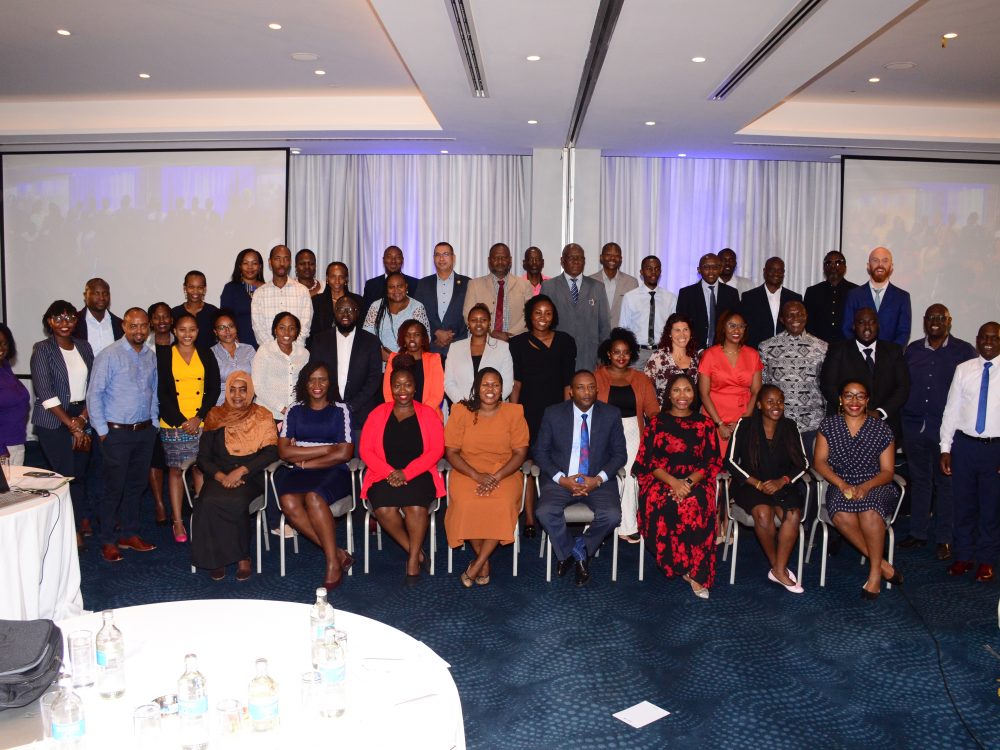
Two Recommendations for Accelerating Digital Agriculture and Data Use
With the aim of improving the efficiency of agriculture data use, Development Gateway: An IREX Venture (DG), Jengalab, and TechChange—with a grant from the International Fund for Agricultural Development (IFAD)—recently held a learning event, titled “Digital Agriculture: Building the Agricultural Systems of Tomorrow,” in Nairobi, Kenya. Participants identified two key recommendations for advancing digital agriculture in order to increase food security.
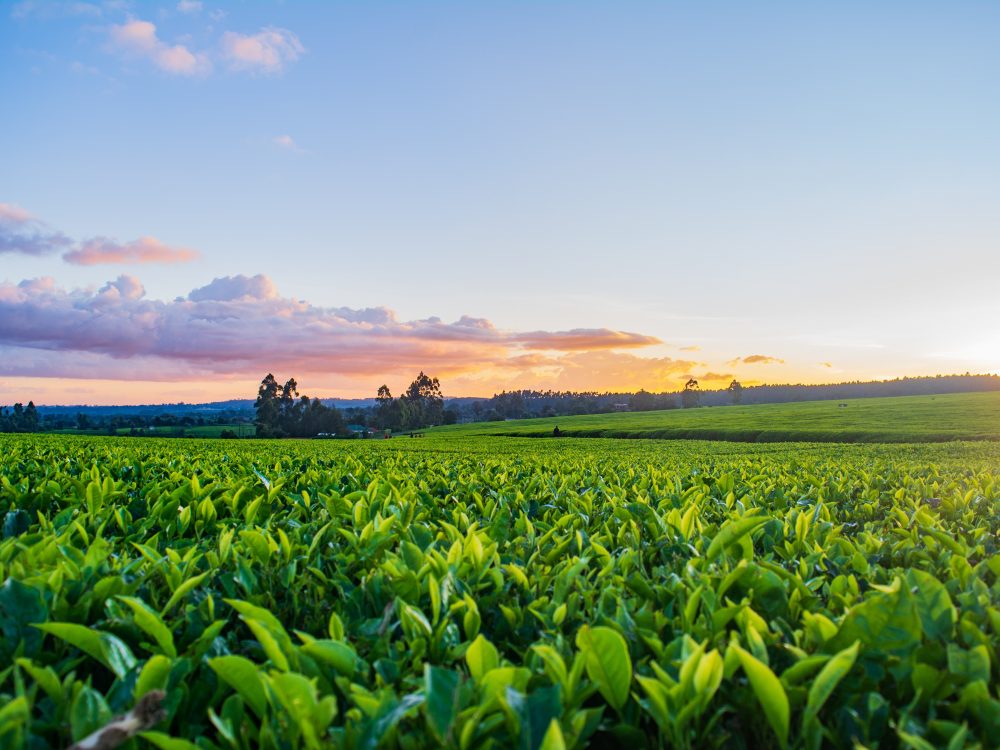
Launching: Digital Advisory Support Services for Accelerated Rural Transformation (DAS)
The Digital Advisory Support Services for Accelerated Rural Transformation (DAS) Program launched in March 2022 and will go through March 2025. Development Gateway: an IREX Venture (DG) will implement the grant in partnership with Jengalab and TechChange to advance Information and Communication Technology for Development (ICT4D) in the agricultural sector across Africa, the Middle East, and Central Asia.

Farmer-Centric Data Governance Assessment: A New Paradigm For LMICs
Our objective in the DAI Farmer-Centric Data Governance Project is to demonstrate opportunities of emerging user-centric models and actions required to create an enabling environment of socio-technical factors needed for implementation.
Two Recommendations for Accelerating Digital Agriculture and Data Use
With the aim of improving the efficiency of agriculture data use, Development Gateway: An IREX Venture (DG), Jengalab, and TechChange—with a grant from the International Fund for Agricultural Development (IFAD)—recently held a learning event, titled “Digital Agriculture: Building the Agricultural Systems of Tomorrow,” in Nairobi, Kenya. The event marked the one year anniversary since the start of the Digital Advisory Support Services for Accelerated Rural Transformation (DAS) Program, implemented by DG through funding from IFAD and in partnership with Jengalab and TechChange.
Attendees at the event included: regional and country-level government decision-makers; government digital practitioners and advisors; actors from the private sector; development partners; and other implementing partners who are key actors or experts in digital agriculture. Because the event brought agriculture experts together from across sectors, discussions included how best to collaboratively address current issues from a variety of digital approaches and skill sets across different agriculture subsectors.
Participants spent the two-day event discussing how digital agriculture and the necessary infrastructure can be used to drive digital transformation, which is at the top of many African countries’ agendas. Participants explored: the differences between digitalization and digitization; the importance of data security and privacy; and the need to support farmers in adopting technological solutions.
From these and other discussions, participants identified two key recommendations (below) for advancing digital agriculture in order to increase food security. In order to better understand these recommendations, we’ll explore what digital agriculture is and both the promise and current barriers that accompany digital agriculture.
What is Digital Agriculture?
Digital agriculture is a term used to refer to the use of digital tools and technologies (also known as AgTech) in order to improve crop yields, increase productivity and profitability, and/or manage livestock. For example, a farmer might use a marketing app to understand the appropriate price at which to sell a crop or use an app to track weather patterns to determine the best time to plant a particular crop.
Digital Agriculture: the Promise and Barriers in Increasing Food Security
As farmers increasingly use digital agriculture, the agriculture sector has more data on agricultural systems, needs, and outcomes than ever before. Food security throughout the world can be advanced when agriculture stakeholders use this data to create informative systems such as early warning systems that flag crop shortages before they happen and traceability systems that monitor the health and productivity of livestock.
While digital agriculture holds great promise for decreasing food insecurity, the burgeoning landscape of digital agriculture tools is siloed, with a variety of actors who often work in isolation. This siloing results in inefficiency. For example, a plethora of digital agriculture tools that address the same need exists while some needs are going unaddressed. In other cases, the data collected with digital agriculture tools isn’t shared with stakeholders in a timely, usable, or optimal manner, if at all. This inefficiency has prevented the full potential of agriculture data use.
Additionally, there are infrastructural barriers. A common hurdle that was highlighted by different country representatives was poor network and connectivity issues, especially in rural areas. Referring to an assessment conducted on Digital Information Systems in Sudan, Atika Marouf from IFAD Sudan pointed that, “The feedback we got from farmers is that the network is very weak in remote areas, some of them do not have electricity, and others are illiterate.”
In order to help address these barriers and other issues, participants at the “Digital Agriculture: Building the Agricultural Systems of Tomorrow” event identified two recommendations on how to advance digital agriculture.
Recommendations
- Create a holistic approach to digital agriculture at the country-level in order to build an impactful strategy for agriculture data, which can promote food security. The basis of this discussion centered on the Digital Agriculture Framework, a strategic guide for digital agriculture which was developed by The Commonwealth Secretariat. The Digital Agriculture Framework outlines how, with the appropriate environments and initiatives, digital agriculture can go from improving local agricultural work to having macro-level impact—such as advancing food security and creating a more inclusive and sustainable agriculture sector in a given country.
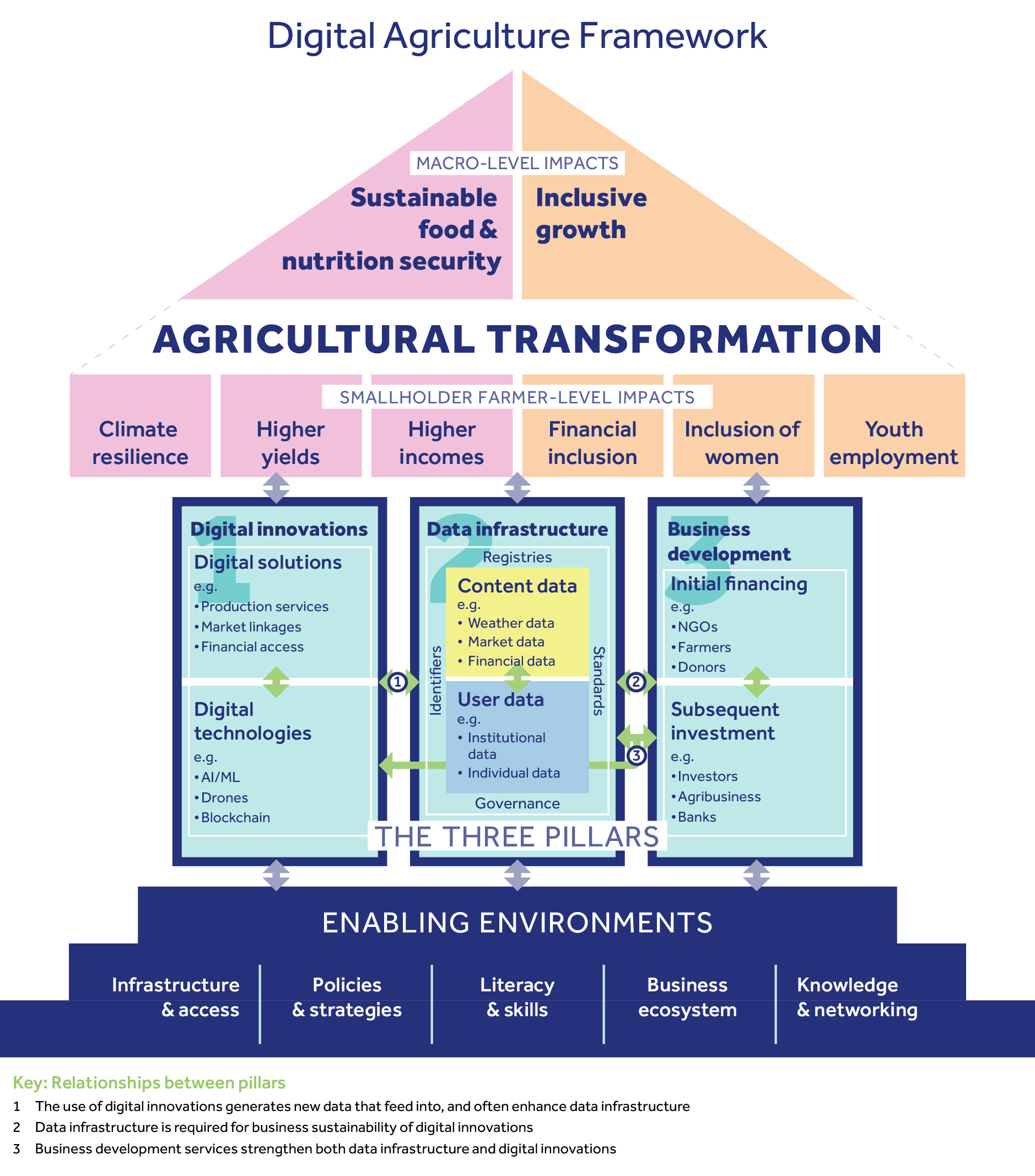
In discussing the Digital Agriculture Framework, participants identified the need for a given country to be consistent and unified in the implementation of digitalization across agricultural sectors within the country. Having a consistent and unified approach in digitalization—which is the process of leveraging digital technologies to advance business practices, improve efficiency, and increase revenue—will allow national governments to identify and implement strategies and policies for advancing digital agriculture at the country level. This approach will also provide data that can be used for the creation of an index for monitoring, assessing, and comparing how countries are leveraging digitalization at the international level.
The Importance of Interoperability
As governments move to invest in and deploy digital infrastructure for agriculture, understanding how digital systems can exchange data, share it, and ensure it is protected and managed safely (or interoperability) is essential. Event participants discussed different models of data infrastructure and sharing with examples that draw from different sources. These included global examples (CGIAR’s Big Data for Agriculture) and continental examples in Africa, Kenya’s KUADP.
- Invest in country-level data and digital infrastructure in order to ensure AgTech and agriculture data are used effectively and appropriately. Participants discussed the importance of creating and maintaining country-level infrastructure that responds to people’s needs and safeguards their rights while also enabling agriculture stakeholders to effectively use AgTech. Key components to building infrastructure for digital agriculture include:
- Identifying the best infrastructure for extension services in local, underserved areas in order to advance the use of AgTech in those areas;
- Collaborating with institutions who have already established sustainable business models for extension services, instead of duplicating efforts to address the extension needs of farmers;
- Ensuring data infrastructure is prioritized in government budgeting (government speakers emphasized the importance of this priority);
- Providing capacity-building training for farmers on the AgTech that’s adopted and used;
- Identifying solutions and standards to allow for better manage of data and support governments in collecting and using farmer data to improve policy work and extension support to farmers; and
- Creating a data governance structure that outlines how agriculture data and findings are shared and ensures data privacy and security laws and best practices are followed.
Next Steps: Making Space
Going forward in DG’s work on digital agriculture, we plan to:
- Host several events in order to continue to create space for learning exchange across IFAD and with critical external partners;
- Publish communications around what doesn’t work well and to share where digital agriculture initiatives can take a different direction; and
- Continue to create space for collaboration. Partnerships between private and public, big and small development partners, development partners and the private sector, are critical to sustainable uptake and use of digital agriculture tools, systems, and data.
Stay tuned for more as we discover what does and doesn’t work well in digital agriculture initiatives!
Share
Recent Posts

Development Gateway Collaborates with 50×2030 Initiative on Data Use in Agriculture
Development Gateway announces the launch of the Data Interoperability and Governance program to collaborate with the 50x2030 initiative on data use in agriculture in Senegal for evidence-based policymaking.

Strengthening Online Safety Through Prevention in the Philippines
Tech-Facilitated Gender-Based Violence continues to evolve alongside emerging technologies. This blog explores how preventative measures, such as the Safety By Design approach, can be used to create a safer internet.

Preparing Jordan’s Education System for the AI Age
This blog introduces Asas, an early grade education program led by IREX and DG in partnership with Jordan’s Ministry of Education, and explores what AI readiness looks like in early grades and how AI can be integrated safely and sustainably into education systems.
HackCorruption: Leveraging Technology & Building Community to Fight Corruption
Corruption is an endemic problem when individuals in positions of power prioritize personal gain over the welfare of the general public. Whether it’s government officials awarding contracts for personal benefit or private sector manipulation through bribery, extortion, and opacity, corruption undermines the very foundations of a just and equitable society.
The impact of corruption extends far beyond individual cases, disproportionately affecting vulnerable populations and worsening existing inequalities. Corruption also hampers development, undermines fair competition, and erodes social trust crucial for sustaining democratic systems. Addressing this issue requires innovative solutions that disrupt opaque and exploitative power dynamics; it’s under this idea that HackCorruption was formed.
Developing digital tools in a community of anti-corruption innovators
HackCorruption—a groundbreaking project led by Accountability Lab and implemented in partnership with the Center for International Private Enterprise and DG—is a series of hackathons bringing people together to leverage emerging technology to co-create anti-corruption solutions. Unlike traditional hackathons, participants don’t need to be experts in digital technology in order to participate. DG provides technical assistance and mentorship to participants from a variety of social and professional backgrounds with a vested interest in fighting for better governance.
But the project’s focus on developing innovative digital tools to fight corruption is just the tip of the iceberg. HackCorruption is unique in that its true essence lies in the relationships forged and the new ideas that emerge, transcending borders and boundaries. At its core, HackCorruption is a community of anti-corruption activists working together to effect positive change in their respective countries and find solutions to transnational corruption.
DG’s involvement in combating corruption has long centered on leveraging data and tech for the public good. Our expertise in using data as a tool for positive change helps uncover corruption’s hidden patterns and consequences, and by creating digital tools that prioritize user experience and engagement, we ensure that technology is accessible and impactful to those who need it the most. Working as technical advisors in HackCorruption is a great fit with DG’s mission to drive the ethical, sustainable, and impactful use of technology.
However, over 20 years of experience has shown us that technology alone cannot solve the world’s trickiest problems. We take a collaboration, learning, and adaptation lens in all of our work, and value sharing back what we have learned in overcoming barriers and challenges to implementing sustainable, well-governed digital and data ecosystems. Working in collaboration with our partners and HackCorruption’s talented cohort of participants from the civic tech, civil society, and activist arenas has demonstrated the power of partnership from diverse groups to maximize impact. This collaborative effort exemplifies the best of technology, knowledge sharing, and community building to tackle one of society’s most entrenched issues.
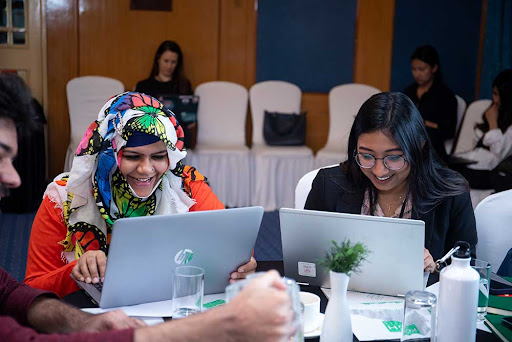
Photo by: Accountability Lab
The impacts of HackCorruption have been significant:
- Innovative digital tools: Participants work together to design and build unique digital tools that may be scaled up and used by international non-governmental organizations (INGOs), governments, and in the private sector to increase transparency and accountability.
- Catalyzing a movement: HackCorruption is catalyzing a movement that uses technology and civic engagement to counteract corruption and shift power toward civil society.
- Community building: Participants in HackCorruption are committed to making a difference and working in a space that transcends institutions, borders, and boundaries. They realize their potential to challenge corruption and shape a better world together.
The fight against corruption is not an isolated battle; it’s a global movement driven by individuals and collaborative efforts. With DG’s technical expertise and commitment to leveraging data for good, this project exemplifies the potential to transform societies and create a world where accountability, justice, and equality prevail. As the next round of HackCorruption kicks off in Colombia for a cohort that includes participants from six Latin American countries, we can anticipate a new class of changemakers working for a brighter, fairer future for all.
Share
Recent Posts

Development Gateway Collaborates with 50×2030 Initiative on Data Use in Agriculture
Development Gateway announces the launch of the Data Interoperability and Governance program to collaborate with the 50x2030 initiative on data use in agriculture in Senegal for evidence-based policymaking.

Strengthening Online Safety Through Prevention in the Philippines
Tech-Facilitated Gender-Based Violence continues to evolve alongside emerging technologies. This blog explores how preventative measures, such as the Safety By Design approach, can be used to create a safer internet.

Preparing Jordan’s Education System for the AI Age
This blog introduces Asas, an early grade education program led by IREX and DG in partnership with Jordan’s Ministry of Education, and explores what AI readiness looks like in early grades and how AI can be integrated safely and sustainably into education systems.

